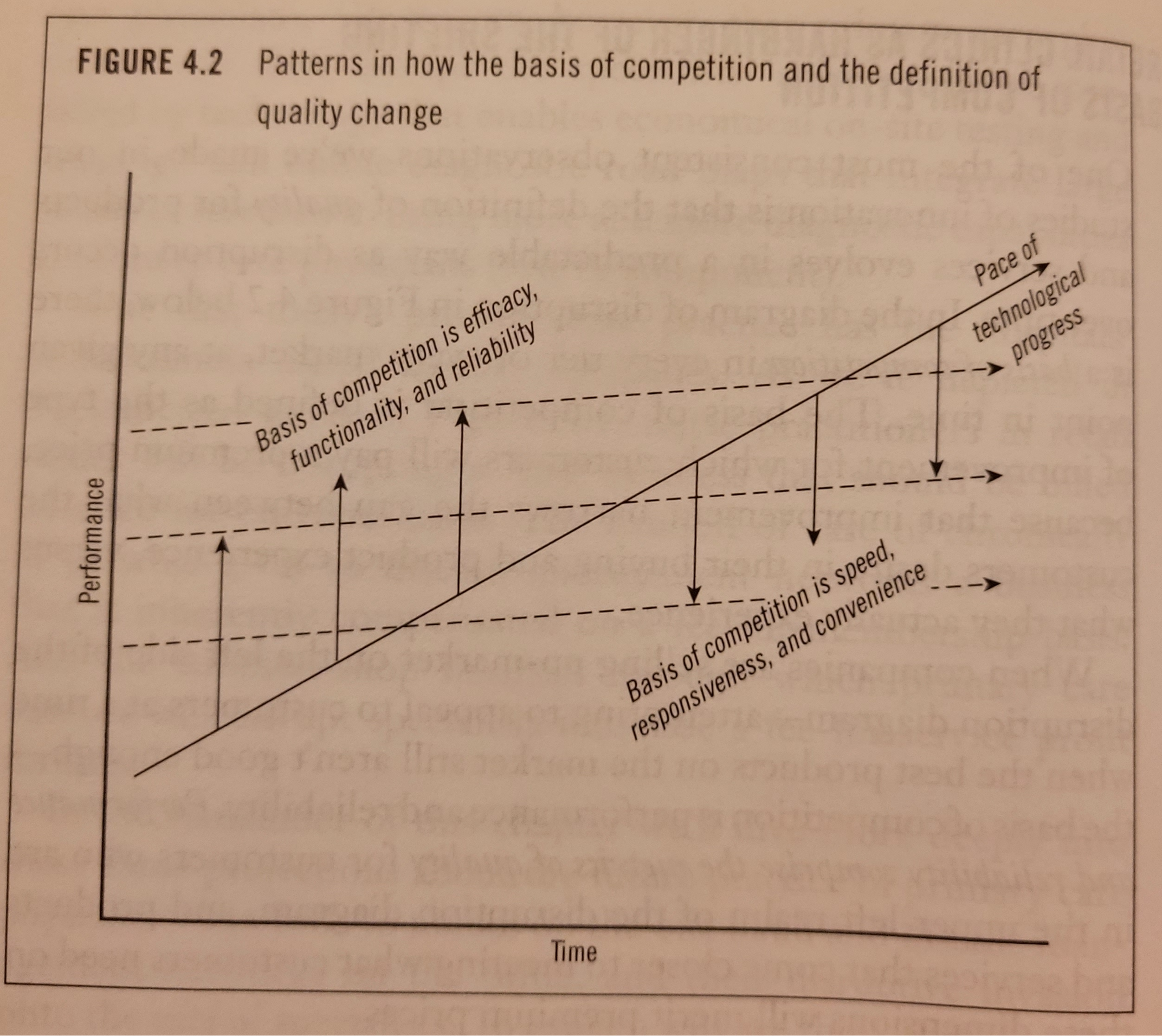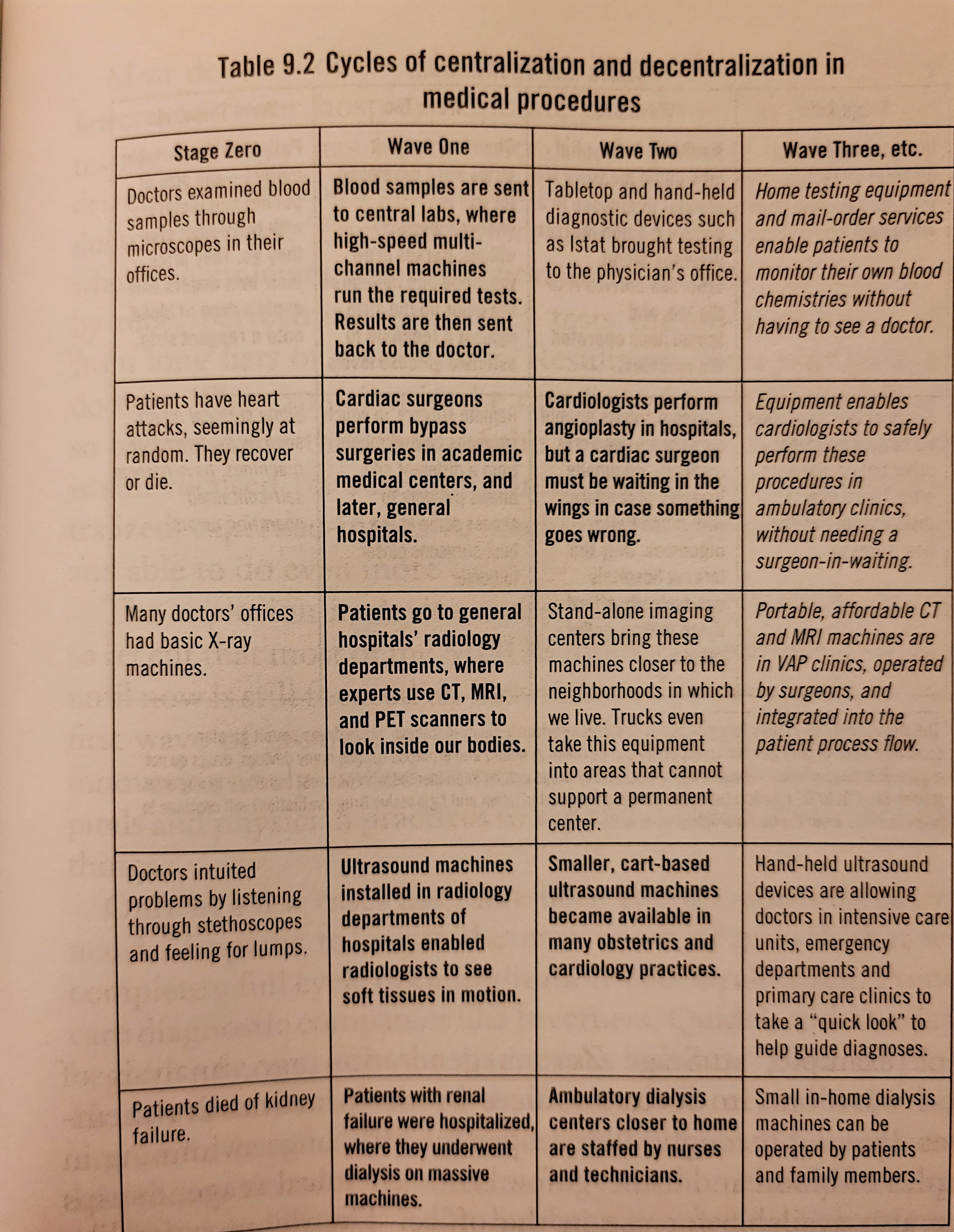Notes from The Innovator's Prescription
Page xvii:
It has taught us that the economist Jean Baptiste Say was right, at least for this industry: when caregivers make more money by providing more care, supply creates its own demand. By some estimates, a staggering 50 percent of health care consumed seems to be driven by physician and hospital supply, not by need or demand.
Page 116:

Instead, they took their business to Dell, because its business model offered improvement on the newly salient dimensions of quality: customization and convenience. … Once things perform well and reliably enough, the spelling of the word “quality” changes to c-o-n-v-e-n-i-e-n-c-e.
Page 190:
Employers generally establish blanket contracts - renewable annually - with one or two health plans … In order to get the best pricing leverage, the health plans in turn negotiate blanket contracts with the major hospital operators in their regions, offering to route members of their plans to those hospitals in exchange for volume discounts for the full range of services that would be required by the covered members. … the effect is that health care offered to patients outside of these plans must be priced very high, in order for the plans to create economic benefit for employers who are paying for health care.
Page 234:
As a result, health assistance companies and providers often find it easier to simply pass cost increases on to the employers, rather than argue with each other about prices. … The result is that some medical services - particularly those that are procedure-based - have remained or become wildly profitable, while others, including office visits and out-of-office care, are undercompensated and therefore undesirable.
Page 243:
Patient Jobs
- Help me and my family to become healthy. Almost universally, becoming well gets top priority when people become sick.
- Help us to remain healthy. One needs only to stand along running trails, or study sales figures for natural foods and nutriceutical products, to see that this is an important job that many (but not all) people are trying to do. Many of those with illnesses like obesity, diabetes, heart disease, asthma, and nicotine addition either don’t feel the urgent need to do this job on a daily basis or find the challenge simply too daunting to overcome.
- Help us achieve financial ability. Financial ability means different things to different people at different stages of life. For the young, it often means acquiring the ability to afford things they want, such as cards, homes, and high-definition flat screen televisions. For the middle-aged, it means saving enough to provide for a comfortable retirement. And so on. One frustrated physician once vented to us that some of his patients seemed “to care more about their wallets than about their health.” This is often true. Until poor health arrives, many people feel the need to achieve financial ability more intensely than the feel the need to be healthy.
- Protect my assets from being taken or destroyed. This is the raison d’être of most types of insurance. We hire property and casualty insurance, mortgage insurance, and auto insurance to protect the value of important assets from being taken or destroyed in the event of theft, accident, or disaster.
Provider and Supplier Jobs
- Help me get paid fairly for products and services rendered. Getting paid at a profitable level is essential to the financial viability of hospitals, physicians, and networks. Providers of solution shop services need to receive fee-for-service payment; those providing value-adding process services can be paid for outcomes; and network facilitators need membership fees. All providers want to be paid in ways that account not just for costs, but for the value of the outcomes achieved - and to be paid promptly with minimal harassment. Similarly, makers of diagnostics, therapeutics, equipment, and other supplies need to remain sufficiently profitable to continue innovating new solutions.
Employer Jobs
- Help me cost-effectively attract and retain the best possible employees, and make them as productive as possible. This job-to-be-done was the primary rationale for putting employers in the business of covering employees’ health-care costs in the first place. This job persists today - and is experienced more urgently, in many companies, than in the past.
Insurance Company Jobs
- Help me avoid paying for unnecessary services. Health assistance companies, whether for-profit (e.g.m Aetna, United?Health), not-for-profit (BCBS), or government (Medicare and Medicaid in the U.S., national systems elsewhere), need to remain financially viable. A key lever for doing this is to pay only for medically appropriate services. This often pits insurers in an adversarial role against providers, whose job is also to make a profit and who submit claims at what they believe are fair prices. A key point of cost control for insurance companies is to deny, delay, or make partial payments - engaging in a costly tit-for-tat with providers that adds significant costs to health care.
Page 317:

Page 320:
The second of the growth compasses for MDDE companies points toward opportunities to commoditize professional expertise … We will get growth and affordability in health care not by replicating the expertise of today’s physicians in the form of new physicians. We will get it by embodying their expertise in devices and equipment, so expertise becomes widely available, more affordable, and much easier to obtain.
Page 377:
Ultimately, the impact of this regulation that funnels the neediest and sickest into our costliest solution shops is to significantly increase costs (and human suffering) through its inadvertent second-order effects. It’s ironic. America’s system, which popular opinion holds excludes the uninsured and the poor from health care, actually guarantees access - albeit access that is costly to the system. In contrast, government systems that are widely viewed as granting universal access often are good at providing access to primary care and other basic services but quite stringently ration more expensive care in an exclusionary way.
Page 392:
Lao-Tzu framed the deregulation strategy of “Starting where they aren’t” better than we have when he wrote, “Water is fluid, soft, and yielding. But water will wear away rock, which is rigid and cannot yield. As a rule, whatever is fluid, soft, and yielding will overcome whatever is rigid and hard. This is another paradox: What is soft is strong.”
Page 393:
Their simple creed is that in the absence of competition, companies will charge monopolists’ prices. If you intensify competition it will drive prices down. It turns out that the hoped-for good news of this gospel often doesn’t materialize. When deregulation or antitrust action pits new entrants against the established industry leaders from the regulated era in sustaining competition, it typically results in an enormous waste of resources and little impact on prices, because the entrants fail. It is disruptive competition that yields dramatic reduction in price and improved accessibility.